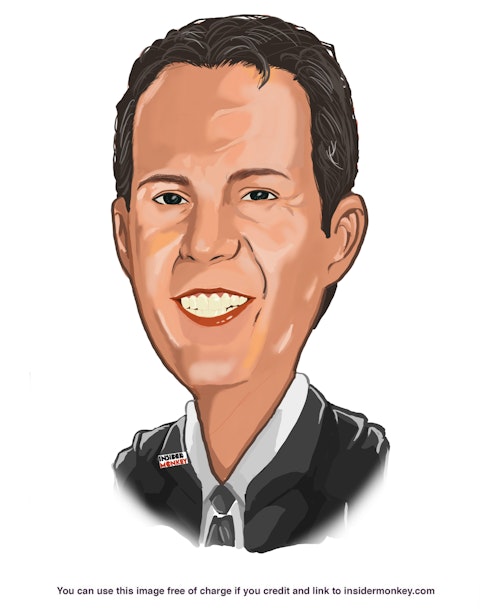4. Element Capital Management
YTD Loss as of November 2021: 8.1%
Element Capital Management is a New York-based hedge fund led by Jeffrey Talpins. Talpins has a net worth of over $2 billion and has based the investments of Element on a global macro strategy. The investment firm had a portfolio value of $228 million at the end of September 2021. In the volatile bond market of October 2021, the fund lost around $1 billion in value, one of the worst casualties of the crisis. In the 16 years since it was founded, Element has managed average annual returns of over 18%, per Financial Times.

Jeffrey Talpins of Element Capital
One of the top investments of Element Capital Management is StoneCo Ltd. (NASDAQ:STNE), a company that operates as a financial technology solutions provider. At the end of the third quarter of 2021, 37 hedge funds in the database of Insider Monkey held stakes worth $2.2 billion in StoneCo Ltd. (NASDAQ: STNE), compared to 44 in the previous quarter worth $2.7 billion.
In its Q2 2021 investor letter, JDP Capital Management, an asset management firm, highlighted a few stocks and StoneCo Ltd. (NASDAQ:STNE) was one of them. Here is what the fund said:
“StoneCo (NYSE: STNE) has been in our portfolio since early 2019 and has appreciated 225% since. In the first half of 2021 the stock was down nearly 20% and was a drag on the fund’s performance.
Stone is a leading fintech company in Brazil that provides back-office software, loans and other financial services to small and medium sized businesses (SMBs). We have discussed Stone in past letters and the company’s “ladder up” from a card processor to a supplier of enterprise software used to sell financial products on top of such as working capital loans.
The company generates a lot of cash that it reinvests to acquire or build new financial products for its customer base. Since we invested, the company has grown the number of SMB clients by 3x, revenue by 2.3x, and net income by 2.2×11.
The pandemic’s impact on SMBs in Brazil has been severe, especially for the many retailers who are only now adopting an e-commerce strategy. In the first half of 2021 Stone increased loss provisions on its lending product, and overall growth has slowed somewhat. The stock’s decline earlier this year was not surprising, but investors are now ignoring progress that has enhanced Stone’s position for coming out much stronger when the recovery begins.
StoneCo Q1 2021 Earnings Call: “Based on (i) our learnings with lockdowns last year, (ii) recent client transactional data and (iii) learnings from the dynamics of countries where vaccines are widespread, we expect that once vaccination scale (which we think will happen in the second half of 2021), the economic recovery will be fast and – although delayed – Brazil is moving in the right direction. For these reasons, we have made an informed decision to be ready for recovery by investing in growth…”
“…In the first quarter, we decided to increase our salesforce headcount by 24%, marketing investments by 33%, customer service and logistics headcount by 32% and technology headcount by 20% in order to be the fastest player when our economy comes back to normal levels.”
“I want to start our presentation by highlighting that Brazil went through a second wave of COVID in the first quarter of ’21, which imposed commerce restrictions in several cities throughout the country. Those restrictions were felt by our clients with average TVP reaching a low in the end of March…
…But similar to the behavior we saw in the comeback from the first lockdown in 2020, we already observed significant and quick recovery with average TPV in May achieving levels above January 2021. As Thiago mentioned, we expect that once vaccinations are scaled, the economy recovery of the country will be fast.”
In terms of COVID recovery opportunities within our portfolio, Stone might be the most “coiled” because the impact on Brazilian small businesses has been so traumatic. In addition, Stone is part of a much larger and fast-moving transition happening in Brazil around the digitization of financial services. The speed of this transition is unique to Brazil because the Central Bank is actively trying to reduce the country’s previous dependency on a small handful of large banks. Important progress in the first half of 2021 included closing on the long-awaited acquisition of Linx, a mature provider of enterprise software with a large footprint across Brazil. The acquisition will provide Stone meaningful cross-selling opportunities and a more diversified customer base.”




